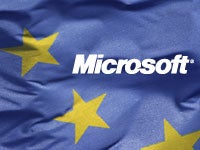 |
UPDATED: Remember what a rough time Microsoft had with the European Commission’s (EC) competition directorate in 2007 and 2008?
If Microsoft CEO Steve Ballmer thought those days of antitrust proceedings were receding into the past, he has another thing coming.
The EC has sent Microsoft a so-called “Statement of Objections,” or SO, indicating that it believes the company has illegally tied its Internet Explorer browser to its Windows operating system since 1996.
After paying nearly a billion dollars in fines this time last year, and another $1.35 billion in fines its appealing, Microsoft can’t seem to get the EC’s antitrust commissioner to stop biting at its pants leg.
“In the SO, the Commission sets out evidence and outlines its preliminary conclusion that Microsoft’s tying of Internet Explorer to the Windows operating system harms competition between web browsers, undermines product innovation and ultimately reduces consumer choice,” a statement released by the EC on Friday states.
Meanwhile, Microsoft appears to be trying to take a proactive approach to its latest contretemps with the EC.
“We are committed to conducting our business in full compliance with European law. We are studying the Statement of Objections now,” according to a Microsoft statement posted on its site on Friday.
The Statement of Objections itself will not be made public, according to an EC spokesperson.
Although Microsoft has been under harsh scrutiny from the EC for several years, and lost a major appeal of an earlier case in September 2007, the latest dispute is linked to a complaint filed more than a year ago by browser maker Opera based in Oslo, Norway.
In its complaint in December 2007, Opera claimed it has been frozen out of the browser marketplace due to Microsoft’s bundling of IE with Windows.
The EC’s statement agrees and says that it has found that the tying behavior goes all the way back to 1996. Given that this case goes back further than earlier EC antitrust actions against Microsoft and involves Microsoft’s Windows cash cow, the penalties if it is found guilty could be astronomical.
Several analysts registered surprised that the EC continues to pursue Microsoft, especially for tying IE with Windows – particularly since IE’s market share has been declining significantly in recent years.
For instance, according to Internet statistics tracker Net Applications, which provides numbers for worldwide usage, in December, IE’s market share was down to 68 percent. Last January, IE held a 75.5 percent share.
During that same period, Firefox’s market share increased from 17 percent to 21 percent, while Apple’s Safari grew from 5.8 percent to nearly 8 percent. Bringing up the rear, Google’s Chrome browser netted just 1 percent by the end of 2008; Opera and Netscape both captured less than 1 percent each.
With Microsoft’s market share declining in the face of challengers Firefox and Safari, and Opera’s share so miniscule to begin with, analysts were baffled about why the EC would pursue Microsoft on tying now.
Besides massive fines, what good would it do to force Microsoft to ship Windows in Europe without IE? After all, a version of Windows that shipped without Windows Media Player as mandated by the EC has been a market failure in the European Union (EU).
“This is the same old stuff,” Tim Bajarin, president of Creative Strategies, told InternetNews.com. “It’s really unfortunate because the EC seems to be establishing an authoritarian role [where] they go after anyone they have a case against,” he added.
Independent analyst Dwight Davis agrees. “I think it’s sort of foolish to pursue Microsoft on the bundling issue,” Davis told InternetNews.com. “Obviously, there’s been some success with Firefox and QApple browsers getting traction.”
Despite IE’s slow decline, though, that is apparently not enough for the EC and its fiery Competition Commissioner Neelie Kroes, who has spoken publicly about her feelings that Microsoft is a predatory monopolist.
Microsoft has eight weeks to respond and is entitled to a hearing, according to the EC’s release.
[cob:Special_Report]
“If the preliminary views expressed in the SO are confirmed, the Commission may impose a fine on Microsoft, require Microsoft to cease the abuse and impose a remedy that would restore genuine consumer choice and enable competition on the merits,” the statement says.
In short, if Microsoft loses this case, it could cost a lot in fines going back to 1996, may force the company to ship Windows in European Union nations sans IE, and perhaps be forced to offer third-party browsers bundled with Windows.
Even after that’s settled, of course, it’s not over.
Besides its outstanding appeal on the earlier case, Microsoft also still faces scrutiny over whether or not its actions in obtaining International Organization for Standardization (ISO) standards status for its Office Open XML file formats violated EC laws.
(Update adds analyst comments.)


